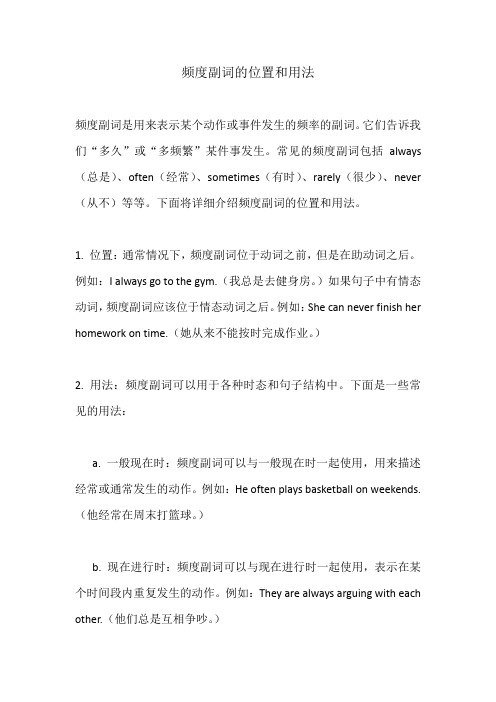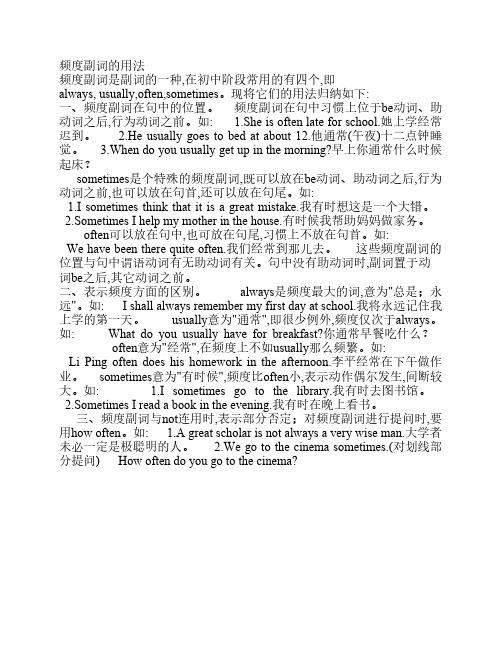频度副词的位置
频度副词的位置

频度副词的位置频度副词的位置1 放在动词前面放在动词前面They sometimes stay up all night. 他们有时候彻夜不眠。
他们有时候彻夜不眠。
I usually go to bed at eleven. 我通常十一点睡觉。
我通常十一点睡觉。
2 放在助动词后面(主要动词前面)放在助动词后面(主要动词前面)He can never understand that. 他永远理解不了这一点。
他永远理解不了这一点。
I have often thought of you. 我常常想到你。
我常常想到你。
3 如句子中有动词,则通常放在后面如句子中有动词,则通常放在后面He is always at home in the evening. 他晚上总在家。
他晚上总在家。
She is often late. 她常常迟到。
她常常迟到。
4 为了强调可以放在句首为了强调可以放在句首Always, we went on foot. 我们总是步行。
我们总是步行。
Sometimes we’re busy and sometimes we’re not. 我们有时候很忙,有时不忙。
我们有时候很忙,有时不忙。
频度副词的位置频度副词的位置1 放在动词前面放在动词前面They sometimes stay up all night. 他们有时候彻夜不眠。
他们有时候彻夜不眠。
I usually go to bed at eleven. 我通常十一点睡觉。
我通常十一点睡觉。
2 放在助动词后面(主要动词前面)放在助动词后面(主要动词前面)He can never understand that. 他永远理解不了这一点。
他永远理解不了这一点。
I have often thought of you. 我常常想到你。
我常常想到你。
3 如句子中有动词,则通常放在后面如句子中有动词,则通常放在后面He is always at home in the evening. 他晚上总在家。
频度副词在句中的位置是什么

频度副词在句中的位置是什么一、usually, sometimes, always, often等词在英文中被称为“频度副词”,是用来表示动作频率的,但程度上有别。
一般说来可按频率大小排列:always>usually>often>sometimes>seldom(很少)>never(决不)二、频度副词的位置1. 在be动词之后。
如:She is sometimes very busy. 她有时很忙。
2. 在第一个动词或情态动词之后。
如:I will never forget the first time I met you. 我将永远忘不了和你的第一次见面。
3. 在实义动词之前。
如:We often go there. 我们常去那儿。
4. sometimes也可放在句首、句中或句末,often也可放在句末。
如:Sometimes she writes to me. 她有时候给我写信。
She writes to me often. 她经常给我写信。
三、用法1. often, always, usually等通常和一般现在时连用,表示现在经常或反复发生的动作。
如:It often rains here in April. 这儿四月份常下雨。
2. always与进行时连用时,并不强调动作正在进行,而是表示赞叹、厌烦等情绪。
如:He is always thinking of others. 他总是想着别人。
(赞叹)She is always asking silly questions. 她老是问些愚蠢的问题。
(厌烦)3. 对这些频度副词提问时,用how often。
如:I write to my brother sometimes. How often do you write to your brother?英语中always, usually, often, sometimes, seldom, never等,叫做频度副词。
频度副词及时间表达法

频度副词含义:表示次数,频率的副词称为频度副词.比如像usually,sometimes,always,often.位置:(1)在be动词之后,eg:she is sometimes very busy。
他有时很忙。
(2)在第一个助动词或情态动词之后,eg:I will never forget the first time I met you。
我永远不会忘记我们的第一次见面。
(3)在实意动词之前.We often go there.我们经常去那儿。
(4)sometimes可放在句首、句中或句末,often放在句中或句末。
Eg:sometimes she watches TV。
他有时看电视。
She watches TV often.用法:often,always,usually,等常和一般现在时连用,表示经常或反复发生的动作。
Eg:it often rains here。
·对频度副词的提问用how often.Eg;I sometimes write to my brother。
有时候,我写信给我的弟弟。
How often do you write to your brother?你多久给你弟弟写一次信?辨析:sometimes,some times,sometime,some timeSometimes,频度副词,意为“有时”Some times名词短语,意为“好多次,”“几倍'sometime副词意为过去或将来的某个时候Some time名词短语意为“一段时间”Eg:I sometimes play games with her。
我有时和他玩游戏.I have read the book some times.这本书我已经读了这本书好几遍了.Come to see us sometime。
找个时间来看我们。
I will stay here for some time。
我将在这儿呆一段按时间。
频度副词的位置和用法

频度副词的位置和用法频度副词是用来表示某个动作或事件发生的频率的副词。
它们告诉我们“多久”或“多频繁”某件事发生。
常见的频度副词包括always (总是)、often(经常)、sometimes(有时)、rarely(很少)、never (从不)等等。
下面将详细介绍频度副词的位置和用法。
1. 位置:通常情况下,频度副词位于动词之前,但是在助动词之后。
例如:I always go to the gym.(我总是去健身房。
)如果句子中有情态动词,频度副词应该位于情态动词之后。
例如:She can never finish her homework on time.(她从来不能按时完成作业。
)2. 用法:频度副词可以用于各种时态和句子结构中。
下面是一些常见的用法:a. 一般现在时:频度副词可以与一般现在时一起使用,用来描述经常或通常发生的动作。
例如:He often plays basketball on weekends.(他经常在周末打篮球。
)b. 现在进行时:频度副词可以与现在进行时一起使用,表示在某个时间段内重复发生的动作。
例如:They are always arguing with each other.(他们总是互相争吵。
)c. 一般过去时:频度副词可以与一般过去时一起使用,表示过去经常发生的动作。
例如:She rarely visited her grandparents when she was young.(她小时候很少去看她的祖父母。
)d. 其他时态:频度副词可以与其他时态一起使用,用来表示频率或习惯性的动作。
例如:I will never forget this moment.(我永远不会忘记这一刻。
)总之,频度副词的位置是在动词之前、助动词之后,用法灵活多样,可以与各种时态和句子结构一起使用,用来描述某个动作或事件发生的频率。
频率副词用法

频率副词:一般用来表示动作发生的频率。
往往放在句子中间,实义动词之前,非实义动词之后;非实义动词分为1 系动词be。
2 助动词帮助动词构成时态(do,does,will,shall,have,had,has)。
3 情态动词(must,can,may).除此之外,都叫做实义动词。
常见频度副词按频率大小排列如下:always(100%)>usually(80%)〉often(60%)>sometimes(40%)〉seldom(20%)〉hardly (10%)〉rarely never(1%)1。
频率副词是表示与次数,频率有关的副词,如:always(总是),usually(通常),frequently(经常) often (经常)sometimes(有时), seldom(不常),rarely(极少),never(从不) once(一次),twice(两次),等.2。
频率副词等级:all the time 100%;almost ,always 90%;generally ,usually 80%;often ,frequently 60-70%;as often as not 40-50%;sometimes ,at times 20-30%;occasionally , from time to time 10%;hardly ,seldom , rarely 5%;never 0%.3。
频率副词用在be动词后。
He always gets up at 6:30。
他经常六点半起床。
4.频率副词用在主要动词前。
My father usually walks home.我的父亲经常步行回家。
5。
频率副词用在助动词与实义动词之间。
I will always love you。
我将永远爱你。
6.频率副词用在ought to之间。
You ought often to write to your mother.你应该常给你母亲写信。
频度副词的用法

频度副词的用法频度副词是副词的一种,在初中阶段常用的有四个,即always, usually,often,sometimes。
现将它们的用法归纳如下:一、频度副词在句中的位置。
频度副词在句中习惯上位于be动词、助动词之后,行为动词之前。
如: 1.She is often late for school.她上学经常迟到。
2.He usually goes to bed at about 12.他通常(午夜)十二点钟睡觉。
3.When do you usually get up in the morning?早上你通常什么时候起床?sometimes是个特殊的频度副词,既可以放在be动词、助动词之后,行为动词之前,也可以放在句首,还可以放在句尾。
如:1.I sometimes think that it is a great mistake.我有时想这是一个大错。
2.Sometimes I help my mother in the house.有时候我帮助妈妈做家务。
often可以放在句中,也可放在句尾,习惯上不放在句首。
如:We have been there quite often.我们经常到那儿去。
这些频度副词的位置与句中谓语动词有无助动词有关。
句中没有助动词时,副词置于动词be之后,其它动词之前。
二、表示频度方面的区别。
always是频度最大的词,意为"总是;永远"。
如: I shall always remember my first day at school.我将永远记住我上学的第一天。
usually意为"通常",即很少例外,频度仅次于always。
如: What do you usually have for breakfast?你通常早餐吃什么?often意为"经常",在频度上不如usually那么频繁。
如:Li Ping often does his homework in the afternoon.李平经常在下午做作业。
频率副词用法
之欧侯瑞魂创作频率副词:一般用来暗示举措发生的频率.往往放在句子中间,实义动词之前,非实义动词之后;非实义动词分为1 系动词be.2 助动词帮手动词构成时态(do,does,will,shall,have,had,has).3 情态动词(must,can,may).除此之外,都叫做实义动词.罕见频度副词按频率年夜小排列如下:always(100%)>usually(80%)>often(60%)>sometimes (40%)>seldom(20%)>hardly (10%)>rarely never(1%)1.频率副词是暗示与次数,频率有关的副词,如:always(总是), usually(通常),frequently(经常) often (经常)sometimes(有时), seldom(不常),rarely(极少),never(从不) once(一次), twice(两次),等.2.频率副词品级 :all the time 100%;almost , always 90%;generally , usually 80%;often , frequently 60-70%;as often as not 40-50%;sometimes , at times 20-30%;occasionally , from time to time 10%;hardly , seldom , rarely 5%;never 0%.3.频率副词用在be动词后.He always gets up at 6:30.他经常六点半起床.4.频率副词用在主要动词前.My father usually walks home.我的父亲经常步行回家.5.频率副词用在助动词与实义动词之间.I will always love you.我将永远爱你.6.频率副词用在ought to之间.You ought often to write to your mother.你应该常给你母亲写信.7.在答句中,频率副词必需放在助动词前.Do you often go there?你常去那里吗?(误)Yes, I do often.是的,我常去.(正)Yes, I often do.是的,我常去.8.never(从不), seldom(很少,不常)用于句首时,句子要用倒装形式以加强语气.Never have I been there.我从未去过那里.Seldom do I watch TV.我很少看电视.9.sometimes(有时)和usually(通常)可以放在句前和句末.Sometines I go to school by bus.我有时坐公交车上学.I go to school by bike usually.我通常骑车上学.用法编纂在否定句中的用法在否定句中,有的频度副词位于否定词之前或之后均可,而有的频度副词则必需位于否定词之后,还有的频度副词却必需要位于否定词之前.年夜致情况如下:1. 频度副词usually和often可位于否定词not之前或之后.他们不常开这样的晚会.正:They don’t often hold such parties.正:Th ey often don’t hold such parties.星期日我们一般不在9点以前起床.正:We don’t usually get up before nine on Sundays.正:We usually don’t get up before nine on Sundays.在否定句中,频度副词用于句中或句首,有时但会招致意思分歧.He doesn’t usually sleep for two days at a time. 他很少一连睡两天.Usually he doesn’t sleep for two days at a time. 他连续两天不睡觉是常事.2. 频度副词always总是位于否定词之后,不成位于否定句之前.Things are not always what they seem to be. 外表往往是靠不住的.Silence must not always be read as consent. 缄默其实不见得一定意味着同意.3. 频度副词sometimes总是位于否定词之前,不成位于否定词之后.Jim is sometimes not very punctual. 吉姆有时不太准时.Debbie is sometimes not responsible for what she does. 黛比有时对她所做的事不负责任.位于句末的用法1.sometimes常可用于句末. 如:We all get into trouble sometimes. 我们有时城市遇到麻烦.You can’t work all the time,it doe s you good to go out and enjoy yourself sometimes.你不能总是工作,有时出去放松一下会对你有好处.2. often有时可置于句末,但通常会带有very, quite, fairly, more, so等修饰语.如:We’ve been there quite often. 经常去那里.When I was young, I used to play tennis very often. 我年轻时经常打网球.Diana used to travel a lot. These days she doesn’t go away so often.娜过去经常旅游.这些天她不常出门了.We're not exactly on intimate terms, but we see each other fairly often.虽算不上关系密切,但还罕见面.注:有时也可不带修饰语,但主要见于否定句或疑问句. 如:He writes to me often. 他经常给我写信.Do you come here often? 你常来这儿吗?I don’t come here often. 我不常来这儿.3. usually有时也用于句末,其前不用修饰语.I’m not late, usually. 我通常不迟到.I get paid on Fridays usually. 我通常在星期五领工资.4.seldom 一般不用于句末,除非其前带有only,very等修饰.We go out very seldom. 我们绝少外出.I play basketball very seldom indeed. 我很少打篮球.5. always一般不用于句末,偶尔用于句末,此时它不表法“总是”,而暗示“永远”.I’ll love you always. 我将永远爱你.另外,有时用于句末是因为句子有所省略的缘故.Generally they walked together on Sunday, but not always.他们一般在星期日一起散步,但其实不总是如此.句中的but not always=but they didn’t always walk together on Sunday.位于句首的用法1. sometimes常可用于句首.Sometimes she comes late. 有时她来得晚.Sometimes she didn’t agree with me. 有时她和我意见纷歧致.Sometimes we get a lot of rain in August. 有时在8月份雨水很年夜.2. often用于句首时,通常暗示强调,且其前一般有quite, very修饰.Very often he comes in late. 他经常迟到.Quite often the phone rings when I’m in the bath. 德律风经常在我洗澡时响.ually有时也用于句首,其前不用修饰语.Usually I get up early. 我平时起得早.Sometimes he comes by bus, but usually he comes by taxi.有时他坐公共汽车来,不外他通常还是打的来.Usually cooking pots have two small handles but pans have one long handle.通常地深底煮锅有两只把手而平底锅只有一个长长的把手.4.always一般不用于句首,除非是用在祈使句中.Always remember this. 请时刻记住这一点.Always look in the mirror before starting to drive. 一定要先看看反光镜再开车.另外,never也可用于祈使句的句首.Never tell him the news. 千万不要告诉他这消息.Never ask her about her marriage. 决不要问她结婚的事.5.在正式文体中,暗示否定意义的副词seldom, never可位于句首,但此时其后要用倒装语序.Seldom has there been such a happy meeting. 过去很少有过这样愉快的会议.Never did he think the book would be finished so soon. 他可没想到这本书会这么快看完另外,once a year (每年一次), twice a week (每周两次), three times a day (一天三次), every Saturday afternoon (每星期六下午)等,这些时间状语也暗示频率,它们可以和频度副词用在同一个句子中,表达上没有重复.如:We usually go to the cinema four times a month. 我们通常一个月看四次片子.口诀编纂频率副词位置记忆口诀:be后实动前助主间对频率提问用how often或how many times。
频率副词用法
之袁州冬雪创作频率副词:一般用来暗示动作发生的频率.往往放在句子中间,实义动词之前,非实义动词之后;非实义动词分为1 系动词be.2 助动词帮忙动词构成时态(do,does,will,shall,have,had,has).3 情态动词(must,can,may).除此之外,都叫做实义动词.罕见频度副词按频率大小摆列如下:always(100%)>usually(80%)>often (60%)>sometimes(40%)>seldom(20%)>hardly (10%)>rarely never(1%)1.频率副词是暗示与次数,频率有关的副词,如:always(总是), usually(通常),frequently(常常)often (常常)sometimes(有时), seldom(不常),rarely (极少),never(从不) once(一次), twice(两次),等.2.频率副词等级 :all the time 100%;almost , always 90%;generally , usually 80%;often , frequently 60-70%;as often as not 40-50%;sometimes , at times 20-30%;occasionally , from time to time 10%;hardly , seldom , rarely 5%;never 0%.3.频率副词用在be动词后.He always gets up at 6:30.他常常六点半起床.4.频率副词用在主要动词前.My father usually walks home.我的父亲常常步行回家.5.频率副词用在助动词与实义动词之间.I will always love you.我将永远爱你.6.频率副词用在ought to之间.You ought often to write to your mother.你应该常给你母亲写信.7.在答句中,频率副词必须放在助动词前.Do you often go there?你常去那边吗?(误)Yes, I do often.是的,我常去.(正)Yes, I often do.是的,我常去.8.never(从不), seldom(很少,不常)用于句首时,句子要用倒装形式以加强语气.Never have I been there.我从未去过那边.Seldom do I watch TV.我很少看电视.9.sometimes(有时)和usually(通常)可以放在句前和句末.Sometines I go to school by bus.我有时坐公交车上学.I go to school by bike usually.我通常骑车上学.用法编辑在否定句中的用法在否定句中,有的频度副词位于否定词之前或之后都可,而有的频度副词则必须位于否定词之后,还有的频度副词却必须要位于否定词之前.大致情况如下:1. 频度副词usually和often可位于否定词not之前或之后.他们不常开这样的晚会.正:They don’t often hold such parties.正:They often don’t hold s uch parties.星期日我们一般不在9点以前起床.正:We don’t usually get up before nine on Sundays.正:We usually don’t get up before nine on Sundays.在否定句中,频度副词用于句中或句首,有时但会导致意思分歧.He doesn’t usually sleep for two days at a ti me. 他很少一连睡两天.Usually he doesn’t sleep for two days at a time. 他持续两天不睡觉是常事.2. 频度副词always总是位于否定词之后,不成位于否定句之前.Things are not always what they seem to be. 外表往往是靠不住的.Silence must not always be read as consent. 沉默其实不见得一定意味着同意.3. 频度副词sometimes总是位于否定词之前,不成位于否定词之后.Jim is sometimes not very punctual. 吉姆有时不太准时.Debbie is sometimes not responsible for what shedoes. 黛比有时对她所做的事不负责任.位于句末的用法1.sometimes常可用于句末. 如:We all get into trouble sometimes. 我们有时都会遇到费事.You can’t work all the time,it does you good to go out and enjoy yourself sometimes.你不克不及总是工作,有时出去放松一下会对你有好处.2. often有时可置于句末,但通常会带有very, quite, fairly, more, so等修饰语.如:We’ve been there quite often. 常常去那边.When I was young, I used to play tennis very often. 我年老时常常打网球.Diana used to travel a lot. These days she doesn’t go away so often.娜过去常常旅游.这些天她不常出门了.We're not exactly on intimate terms, but we see each other fairly often.虽算不上关系紧密亲密,但还罕见面.注:有时也可不带修饰语,但主要见于否定句或疑问句. 如:He writes to me often. 他常常给我写信.Do you come here often? 你常来这儿吗?I don’t come here often. 我不常来这儿.3. usually有时也用于句末,其前不必修饰语.I’m not late, usually. 我通常不迟到.I get paid on Fridays usually. 我通常在星期五领工资.4.seldom 一般不必于句末,除非其前带有only,very 等修饰.We go out very seldom. 我们绝少外出.I play basketball very seldom indeed. 我很少打篮球.5. always一般不必于句末,偶然用于句末,此时它不表法“总是”,而暗示“永远”.I’ll love you always. 我将永远爱你.别的,有时用于句末是因为句子有所省略的缘故.Generally they walked together on Sunday, but not always.他们一般在星期日一起散步,但其实不总是如此.句中的but not always=but they didn’t always walk together on Sunday.位于句首的用法1. sometimes常可用于句首.Sometimes she comes late. 有时她来得晚.Sometimes she didn’t agree with me. 有时她和我意见纷歧致.Sometimes we get a lot of rain in August. 有时在8月份雨水很大.2. often用于句首时,通常暗示强调,且其前一般有quite, very修饰.Very often he comes in late. 他常常迟到.Quite often the phone rings when I’m in the bath. 电话常常在我洗澡时响.ually有时也用于句首,其前不必修饰语.Usually I get up early. 我平时起得早.Sometimes he comes by bus, but usually he comes by taxi.有时他坐公共汽车来,不过他通常还是打的来.Usually cooking pots have two small handles but pans have one long handle.通常地深底煮锅有两只把手而平底锅只有一个长长的把手.4.always一般不必于句首,除非是用在祈使句中.Always remember this. 请时刻记住这一点.Always look in the mirror before starting to drive. 一定要先看看反光镜再开车.别的,never也可用于祈使句的句首.Never tell him the news. 千万不要告诉他这消息.Never ask her about her marriage. 决不要问她成婚的事.5.在正式文体中,暗示否定意义的副词seldom, never可位于句首,但此时其后要用倒装语序.Seldom has there been such a happy meeting. 过去很少有过这样愉快的会议.Never did he think the book would be finished so soon. 他可没想到这本书会这么快看完别的,once a year (每一年一次), twice a week (每周两次), three times a day (一天三次), every Saturday afternoon(每星期六下午)等,这些时间状语也暗示频率,它们可以和频度副词用在同一个句子中,表达上没有重复.如:We usually go to the cinema four times a month.我们通常一个月看四次电影.口诀编辑频率副词位置记忆口诀:be后实动前助主间对频率提问用how often或how many times。
初中语法 频度副词的用法
初中语法频度副词的用法频度副词是用来描述动作或事件发生的频繁程度的副词。
在初中语法中,频度副词的用法是非常重要的。
它们可以帮助我们准确地表达某件事情发生的频率,并且可以让我们的语句更加生动有趣。
下面我将详细介绍频度副词的用法。
1. 频度副词的分类频度副词可以按照频率的程度分为六个等级:always(总是)、usually(通常)、often(经常)、sometimes(有时)、rarely(很少)、never(从不)。
它们根据动作或事件发生的频繁程度从高到低进行排列。
2. 频度副词的位置通常情况下,频度副词位于行为动词之前,表示行为动作的频率。
例如:- I always go to bed early.- She usually brushes her teeth after meals.3. 频度副词的变化有些频度副词可以通过在词尾加上"-ly"来构成,例如usually和rarely。
而有些频度副词则是不规则的,如always、often、sometimes和never。
4. 频度副词的修饰范围频度副词可以修饰行为动词、形容词和副词。
例如:- He always speaks English fluently.(修饰行为动词)- The weather is usually sunny.(修饰形容词)- She walks to school sometimes.(修饰副词)5. 频度副词的其他用法除了修饰动词、形容词和副词外,频度副词还可以在句子中起到其他的作用。
例如:- Usually, I prefer to study in the morning.(作为句子开头的插入语)- He rarely goes to the cinema.(作为独立的句子成分)- I never thought I would see you here.(强调某种情感或感叹)6. 频度副词的注意事项在使用频度副词时,需要注意以下几点:- 频度副词通常放在一般现在时的句子中,表示习惯或经常性的动作。
频率副词用法
频率副词用法文件管理序列号:[K8UY-K9IO69-O6M243-OL889-F88688]频率副词:一般用来表示动作发生的频率。
往往放在句子中间,实义动词之前,非实义动词之后;非实义动词分为1 系动词be.2 助动词帮助动词构成时态(do,does,will,shall,have,had,has).3 情态动词(must,can,may)。
除此之外,都叫做实义动词。
常见频度副词按频率大小排列如下:always(100%)>usually(80%)>often(60%)>sometimes (40%)>seldom(20%)>hardly (10%)>rarely never(1%)1.频率副词是表示与次数,频率有关的副词,如:always(总是), usually(通常),frequently(经常) often (经常)sometimes(有时), seldom(不常),rarely(极少),never(从不)once(一次), twice(两次),等。
2.频率副词等级 :all the time 100%;almost , always 90%;generally , usually 80%;often , frequently 60-70%;as often as not 40-50%;sometimes , at times 20-30%;occasionally , from time to time 10%;hardly , seldom , rarely 5%;never 0%。
3.频率副词用在be动词后。
He always gets up at 6:30.他经常起床。
4.频率副词用在主要动词前。
My father usually walks home.我的父亲经常步行回家。
5.频率副词用在助动词与实义动词之间。
I will always love you.我将永远爱你。
- 1、下载文档前请自行甄别文档内容的完整性,平台不提供额外的编辑、内容补充、找答案等附加服务。
- 2、"仅部分预览"的文档,不可在线预览部分如存在完整性等问题,可反馈申请退款(可完整预览的文档不适用该条件!)。
- 3、如文档侵犯您的权益,请联系客服反馈,我们会尽快为您处理(人工客服工作时间:9:00-18:30)。
英语中回答"经常与否"的副词称为频度副词(Adverbs of Frequency)。
频度副词主要有:always,usually,sometimes,occasionally,seldom,never,generally,frequently,hardly,ever,never,rarely, constantly,continually,scarcely 等。
频度副词有的表示动作的经常性或事物的经常状态,有的表示动作的不规则的反复。
频度副词在句子中的位置常常因谓语动词的不同而变化。
其基本规律如下:
1.当句子的谓语动词是行为动词时,频度副词一般放在谓语动词之前。
例如:
I hardly ever heard her singing.我几乎从未听她唱过歌。
2.有时为了达到对比或强调的目的,频度副词也可以放在句首。
例如:
Sometimes he goes to school by bus and sometimes he cycles to school.有时他乘车去上学,有时骑车去上学。
3.never,seldom,rarely,scarcely 这类表示否定意义的频度副词置于句首时,句子要倒装。
例如:
Never in my life have I heard or seen such a thing. 有生以来我从未听到过或见到过这种事情。
4.often 在被very 或者quite 修饰时,要放在句末。
例如:
I didn't write to my mother very often. 我不常给母亲写信。
但有时为了行文流畅或特别强调,quite often 和very often 也可以放在句首。
例如:
Very often the wind was too strong for us to go out. 经常由于风太大我们不能出去。
5.当句子里有情态动词或助动词时,频度副词要放在这类动词的后面。
例如:
This job will never be finished.这项工作永远也完不成了。
I do not often have headache.我不常头痛。
但是,当这些情态动词、助动词需要强调时,频度副词要放在它们之前,朗读时要重读情态动词及助动词。
例如:
They always can find time for English. 他们总能找到时间学习英语。
(can 应读强式[k n])
-Why don't you stop smoking?
-你为什么不戒烟?
-But I never have smoked.
-我从来也不吸烟。
(have要读强式[h v])
6.have to 表示客观需要的"不得不"时,虽相当于情态动词,但频度副词要放在它之前。
例如:
I often have to get up at five. 我经常得五点钟起床。
7.当句子中有used to 这个"临界性情态动词"时,频度副词既可以在其前也可以在其后。
例如:
We always used to go to the seaside in May.
We used to always go to th
托福(toefl)语法技巧:频度副词
a)always,continually,frequently,occasionally,often,once,twice,periodically,repeatedly,sometimes,usually等(b)ever,hardly ever,never,rarely,scarcely ever,seldom等
A 以上两组副词通常用在下列位置:
1 动词be的一般现在时后面:
He is always in time for meals.
他总是赶得上吃饭。
2 放在其他动词的一般现在时前面:
They sometimes stay up all night.
他们有时整夜不睡。
3 动词如是复合时态并由一个以上动词构成时,这类副词放在第一个助动词后面;如果动词是疑问式,则放在助动词+主语之后:
He can never understand.
他永远也不会明白的。
You have often been told not to do that.
多次告诫过你别干那事。
Have you ever ridden a camel?
你骑过骆驼吗?
特殊情况
(a)这类副词放在used to和have to的前面:
You hardly ever have to remind him;he always remembers.
你根本不用提醒他;他总是记得的。
(b)如在补充陈述或答话中单独使用助动词,频度副词常放在这类动词之前:
—Can you park your car near the shops?
—Yes,I usually can.
—你可以在商店附近停车吗?
—是的,通常可以。
I know I should take exercise,but I never do.
我知道我应该进行体育锻炼,但我从来没这样做过。
如助动词应重读时,频度副词也常放在助动词之前:
I never′can remember.
我永远也记不住。
She hardly ever′has met him.
她几乎从来没有遇见过他。
当do用于表示强调时,也是如此:
I always′do arrive in time!
我总是及时到达的!
也可以用重读的频度副词来表示强调,这时频度副词仍放在助动词后面:
You should′always check your oil before starting.
每次开车启动前你必须检查一下油量。
上述(a)组副词也可放在句首或句末。
例外情况
除在祈使句中外,always通常放在句末,很少置于句首。
often如果放在句末,通常需要加修饰语very或quite:
Often he walked.
他过去经常步行。
He walked quite often.
(译文同上。
)
上述(b)组副词如hardly ever,never,rarely等(但不包括单独使用的ever)也可放在句首,但这时必需倒装后面的主要动词:
Hardly/Scarcely ever did they manage to meet unobserved.
他们会面时很少不被人看到。
hardly/scarcely ever,never,rarely和seldom不能与否定动词连用。
never,ever
never主要与肯定动词连用而不与否定动词连用。
一般情况下它意为“从未有过”:
He never saw her again
他从没有再见到过她。
I’ve never eaten snails.
我从没吃过蜗牛。
They never eat meat.
他们从来不吃猪肉。
(习惯)
I’ve never had a bett er flight.
我从来没有过这么舒适的飞行。
never+肯定动词有时可以替代一个普通的否定动词:
I waited but he never turned up.
我等着,可他根本没有来。
never+疑问动词可表示说话人对于未能做到某事而感到惊讶:
Has he never been to Japan?I’m surprised,because his wife is Japanese .
他从没去过日本吗?我感到很惊讶,因为他妻子是日本人。
ever意为“在任何时间”,主要用于疑问句中:
—Has he ever marched in a demonstration?
—No,he never has.
—他参加过示威游行吗?
—没有,他从没有。
ever可与否定动词连用,特别是在与复合时态连用时,可代替never+肯定动词:I havent ever eaten snails.
我从没吃过蜗牛。
ever的这种用法在一般现在时中不常见。
ever+肯定动词可以用于比较中,也可以和表示假定和怀疑的词连用。
I don’t s uppose he ever writes to his mother.
我想他没有给他母亲写过信。
